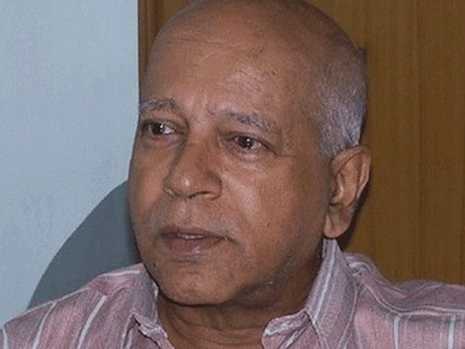
“Is the party over?” That was the headline splashed across the cover of a local magazine as far back as July 2005.
At that time, the notion that India's Bharatiya Janata Party (BJP-Indian People’s Party) might be in terminal decline seemed little short of ludicrous. It was the second largest party in parliament and the main opposition to the ruling coalition led by the Congress Party.
On a springboard of Hindutva ideology or Hindu cultural nationalism, the BJP had catapulted from two seats in the 545-member parliament in 1984 to form the coalition National Democratic Alliance (NDA) government in 1998. But despite its meteoric rise, it crashed to a surprise defeat to the Indian National Congress-led coalition of the United Peoples Alliance (UPA) in the general election of May 2004.
Out of power, the BJP began to splinter within almost immediately. The party's crash seemed as precipitous as its rise. Was this a family squabble, as they claimed, or the beginning of the end for Hindu nationalism as the ideological base of the party?
The BJP is the political face of a Hindutva legacy, which is promoted by the Rashtriya Swayamsevak Sangh (RSS). Besides the BJP, the 4.5 million strong RSS family includes the Vishwa Hindu Parishad - World Hindu Council - whose unabashed aim is establishing “a Hindu state and Hindu glory.”
Many in the BJP believed that with a focused Hindu-only approach, the BJP would never occupy the dominant position in Indian politics that the Congress once enjoyed. They blamed the BJP's poor electoral performance in part on the bloody anti-Muslim pogrom in 2002 in Gujarat, a BJP-ruled state, whose government was accused of complicity in the violence. The BJP’s association with hard line Hindutva, it was argued, cost votes.
However, RSS leaders argue the exact opposite: the problem was that while in office, the BJP was not Hindu enough. To forge a governing coalition in the NDA, the BJP had agreed not to pursue the three big Hindutva demands: the building of a temple in Ayodhya, where Hindu zealots demolished a controversial mosque – a matter it left to the courts; the adoption of a uniform civil law to supplant Muslim family law; and the revocation of the special constitutional status of Kashmir, India's only Muslim-majority state. The BJP’s failure to deliver results on these demands alienated the BJP's core voters and demoralized its activists.
In hindsight, now in 2013, the BJP is going through more than a bad patch. Its continuing quarrel with its parent organization, the RSS, calls into question the party's purpose. Was the party’s main aim to win elections or to promote the RSS ideology of Hindtuva? The parent was making it clear who calls the shots. This is the backdrop of the sordid struggle between the RSS and BJP.
The BJP’s problems are compounded today. Its vote bank has always been the urban middle class. They favor liberal economics, and a growing majority firmly believes in greater equality between the sexes. But the BJP’s instinctively anti-Western stance that women should “remain housewives” according to RSS chief Mohan Bhagwat, or should not cross the Lakshman Rekha - line of freedom - set by men, according to another BJP politician is hopelessly anti-modern.
The divisions within the BJP represent the existential dilemmas of coalition party politics. It is wracked by rebellions from political heavyweights within the party. Their power mongering differences in Karnataka, where they are in power, are on display. The collapse of the BJP coalition in Jarkhand this January is yet another disaster for the party. Even Narendra Modi’s thumping third successive victory in Gujarat – the only bright spot in their otherwise dark political fortunes – has caused more consternation than elation within the BJP leadership, as other parochial leaders jockey against him for national prominence.
While the BJP is forced by its RSS connection to consolidate its Hindu vote bank, the Congress in the UPA tries to gain political mileage by its inaction. They reckon the minorities will be forced to vote Congress, but, at the same time, Hindus must not be antagonized. This is called ‘soft’ Hindutva.
As a result, law and order has come a cropper in the face of expanding Maoist insurgency, widespread state terrorism, increasing fundamentalist terrorism, and militant parochial politics that thrive on sons-of-the-soil ideology in places like Maharashtra.
Nine years of incumbency as leader of the UPA has left the Congress numbed and fatigued. If the decline of the lumbering, corruption-ridden and inept Congress-led UPA is a cause for consternation, a more startling political phenomenon is the debacle of the main BJP-led NDA opposition, which has failed to gather any momentum when the opportunity has presented itself.
The disintegration of the two alliances – the UPA and NDA – may well spell disaster because local state issues will become national imperatives and the nation will be torn asunder. The BJP has to discard its narrow, exclusivist Hindu-only approach and reinvent itself as a genuine secular alternative to the Congress, if it is to occupy a dominant position in Indian politics. Otherwise it will melt down.
Redemptorist Father Desmond D'Souza formerly served as the executive secretary of the Office of Evangelization in the Federation of Asian Bishops’ Conference. He was closely associated with the Churches in Asia from 1980 to 2000. He is now based in Goa.


